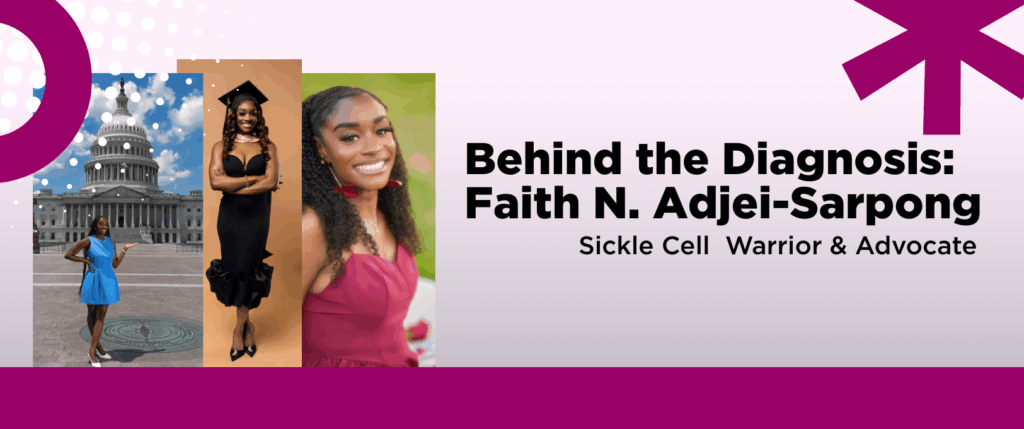Faith’s Story: Living with Resilience

As part of our Beyond the Diagnosis series, we sat down with Faith N. Adjei-Sarpong, MPH — a sickle cell warrior, advocate, and future physician. Her story reflects both the resilience and the systemic challenges faced by those living with this disease.
Faith recalls moments when her pain crises were so severe she could barely breathe or speak, yet she was labeled as “drug-seeking” instead of believed. “That kind of treatment hurts just as much as the pain in my body. It chips away at your dignity and makes you question if you will ever truly be seen,” she shared.
Q&A with Faith N. Adjei-Sarpong, MPH
Tell us a little about yourself.
“My name is Faith N. Adjei-Sarpong, and I was born and raised in Houston, Texas, but my roots are Ghanaian and that part of my identity means a lot to me. I’m a recent MPH graduate and I’m pursuing medical school, but beyond that I’m an advocate, a storyteller, and someone who wears a lot of hats in leadership. I love creating content that blends beauty and wellness, because for me beauty is more than skin deep — it’s about resilience and confidence even in the face of pain. I also love community, whether that’s sitting down with friends, working on student initiatives, or connecting with other warriors.”
What are your earliest memories of living with sickle cell?
“My childhood was shaped by sickle cell. My parents tell me that when I was a baby, the doctors gave them the news, and they carried the weight of that reality even before I could understand it. Some of my earliest memories involve hospital visits, IV poles, and being told I couldn’t always do what other kids could. I missed field trips, I couldn’t play outside in the cold because it was too risky. At the time, it felt isolating. But in the middle of those restrictions, my parents made sure I also had joy. When we lived in California, they took us to places like SeaWorld or Disneyland almost every other weekend. Those trips were magical for me. They reminded me that even though I had this disease, my life could still be full of laughter and wonder.”
What has been one of your biggest challenges?
“One of the hardest challenges has been not just the physical pain but the way the healthcare system treats people with sickle cell. There were times I went to the hospital in crisis, barely able to breathe or speak, and was treated as if my pain wasn’t real. I’ve been labeled as ‘drug-seeking’ or dismissed simply because I’m a young Black woman with sickle cell. That kind of treatment chips away at your dignity. What helps me through those days is my faith in God, which anchors me even when everything else feels unsteady. My family is my biggest support system, always reminding me I’m more than my disease. My community of advocates, friends, and sorors lifts me up too. I lean on music, prayer, and journaling when the pain feels endless. But more than anything, what truly carries me is knowing I’m not alone. The sickle cell community has been a lifeline. That sense of collective resilience keeps me going on the hardest days.”
What do you wish people understood about sickle cell?
“I wish people understood that sickle cell is not just about the ‘crises.’ The pain episodes are brutal, but the disease affects us every single day in ways people don’t see. It’s constant fatigue that makes even simple tasks feel overwhelming. It’s the mental health struggles that come with never knowing when the next crisis will strike. And I want people to realize sickle cell is not rare. Millions live with this disease, yet because it disproportionately affects Black people, it has been ignored, underfunded, and misunderstood for decades. That reality has to change. We deserve the same awareness, investment, and urgency that other chronic illnesses receive.”
What changes do you want to see?
“I want to see real systemic change. That means increased funding for research, expanding access to comprehensive care centers, and making sure healthcare providers are trained to treat us with dignity and compassion. I also want us to break the silence around sickle cell in Black communities. Too often it’s stigmatized or hidden, and that only adds to the burden warriors carry. And I want society to stop reducing us to statistics. We are not just numbers on a chart or patients in a study. We are people with families, dreams, and futures worth investing in. When warriors are treated as human beings deserving of equity and care, that’s when meaningful change will happen.”
How do you want your story to inspire others?
“I want younger warriors to know they don’t have to limit themselves. I was told I wouldn’t go to college, and now I have my Master of Public Health and I’m pursuing medical school. I want them to dream big and know they can achieve those dreams. I’ve had leadership roles, won awards, and even advocated for sickle cell at the U.S. Capitol in front of Congress. Many doubted if I could survive, but I haven’t just survived, I’ve thrived. For families, I want them to know their love and advocacy makes a tangible difference — I’m here today because of my family’s sacrifices. And for policymakers, I want my story to be a call to action. Sickle cell warriors deserve the same urgency, attention, and resources as any other patient group. With the right support and recognition, we can not only endure but thrive.”
Resources for Support
CDC: Sickle Cell Disease
https://www.cdc.gov/ncbddd/sicklecell/index.html
American Society of Hematology Sickle Cell Resources
https://www.hematology.org/education/patients/anemia/sickle-cell-disease
Sickle Cell Disease Association of America

